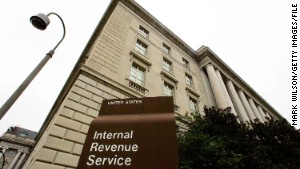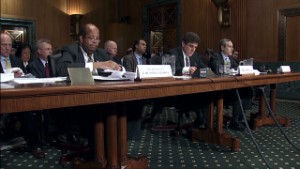- Back to Home »
- One more reason people hate the IRS
- Lois Lerner sparked scandal by revealing the IRS targeted social welfare organizations
- Author: IRS allows some of these groups to spend hundreds of millions on political ads
- The IRS has ignored this problem for more than 50 years, says author Melanie Sloan.
- Sloan: Until Congress does more than express its disdain for the IRS, nothing will change
Editor's note: Melanie Sloan is executive director of Citizens for Responsibility and Ethics in Washington (CREW). Watch CNN's "The Truth about the IRS Scandal," on "Erin Burnett OutFront," tonight, Wednesday and Thursday at 7 p.m. and 11 p.m. ET.
(CNN) -- Hating the Internal Revenue Service is an American pastime that transcends political affiliation.
This past May, disgust for the IRS reached an all-time high when Lois Lerner, director of the IRS's Exempt Organizations unit, disclosed the agency had improperly targeted social welfare organizations seeking special status under section 501(c)(4) of the tax code based on their political ideology.
This revelation resulted in more than three months (and counting) of congressional hearings and investigations.
Read the IRS inspector general's report on targeting
But in typical Washington fashion, the manufactured congressional outrage and grandstanding has served to do little more than obfuscate the real scandal at the IRS: that the agency allows social welfare organizations to manipulate federal tax law by spending hundreds of millions of dollars on political ads.
 Is IRS' tax exempt division objective?
Is IRS' tax exempt division objective?  IRS grilling on Capitol Hill continues
IRS grilling on Capitol Hill continues Anyone who watched television in the lead-up to the 2010 and 2012 elections undoubtedly noticed the slew of vitriolic, misleading campaign ads. Some of these ads were sponsored by federal candidates, but many more were produced by groups with innocuous sounding names -- such as Crossroads GPS or the American Action Network -- but massive bank accounts. Crossroads GPS, for example, a nonprofit organization cofounded by former George W. Bush administration official Karl Rove, spent more than $70 million on the 2012 election.
Like the groups targeted by the IRS, Crossroads GPS is a section 501(c)(4) organization, which affords certain tax benefits and -- most importantly -- the ability to keep the names of donors secret. Federal law requires these groups to operate "exclusively for purposes beneficial to the community as a whole." IRS regulations, however, create a loophole in the law by allowing groups "primarily" engaged in these types of activities to benefit from this tax status. Many 501(c)(4) groups have interpreted this regulation to mean they can spend up to 49% of their funds on political activities -- mostly negative, deceptive political ads.
Adding to the confusion, the IRS has said there is no specific percentage the agency uses to gauge whether a group has engaged "primarily" in social welfare activities, but rather that it considers all facts and circumstances.
What does that mean exactly? No one knows.
When directly confronted about the problem and the agency's record of inaction, the IRS has said only that it is "aware" of the issue.

But the IRS has been aware of and has chosen to ignore this problem for more than 50 years.
If the agency had revised its regulations at any point in the past as my organization and others requested, the agency might have avoided the quagmire in which it is drowning. Frustrated with the IRS's inaction, in May CREW filed a lawsuit against the IRS for flouting the law barring 501(c)(4) organizations from engaging in political activity. The case is pending in District of Columbia district court. Rep. Chris Van Hollen, D-Maryland, and other public interest groups filed a similar lawsuit last month.
Because social welfare organizations are not required to disclose their donors, 501(c)(4) groups have become the de facto vehicle for millionaires, billionaires, and even corporations who want to remain anonymous while influencing our elections. As a result, politically active nonprofit groups spent more than $300 million on the 2012 election.
Melanie Sloan, Citizens for Responsibility and Ethics in Washington
Americans should not only be outraged that our elections are being flooded with anonymous cash, but because of the nonprofit status of these groups, taxpayers are subsidizing their activity.
With more and more groups seeking to participate in federal elections using money raised from donors who want to remain anonymous, applications to the IRS for 501(c)(4) status more than doubled between 2010 and 2012. To manage the deluge, Lerner said the agency relied on code words and other shortcuts to single groups out for extra review.
While the scrutiny of tea party groups has received the most attention, the IRS "Be on the Look Out" (BOLO) list also included the words "progressive," "occupy," and "Israel."
Flagging any group for further screening because their applications included specific words or phrases was wrong.
The impact, however, of such misguided actions on our democracy was negligible, particularly compared to that wrought by the IRS's failure to stop hundreds of millions of dollars from flooding our electoral system to influence our votes.
For all of the abuse heaped upon the IRS and for all the concern about the BOLO list, the same thing could happen again if the disparity between the language of the statute and regulation is not addressed. Agents processing applications of groups seeking social welfare status in the future will remain as confused about the standards as those whose decisions have been questioned this year. Nevertheless, Congress has shown no appetite to pass legislation clarifying the requirements for these nonprofit groups.
As the 2014 election cycle gets under way, the super rich and corporations with deep coffers will continue to buy our elections, and Congress will continue to spend time and resources on a never-ending cycle of investigations into a problem with a fairly easy solution: as Congress intended when it first passed the law, prohibit 501(c)(4) organizations from spending money on anything other than social welfare activities.
As long as members of Congress do nothing other than one-up each other's disdain for the IRS, nothing will change.
And that really is a scandal.
Follow us on Twitter @CNNOpinion.
Join us on Facebook/CNNOpinion.
The opinions expressed in this commentary are solely those of Melanie Sloan.Got a story idea or tip for CNN's investigations team? Go to cnn.com/investigate or click here to submit.
Watch Erin Burnett weekdays 7pm ET. For the latest from Erin Burnett click here.







